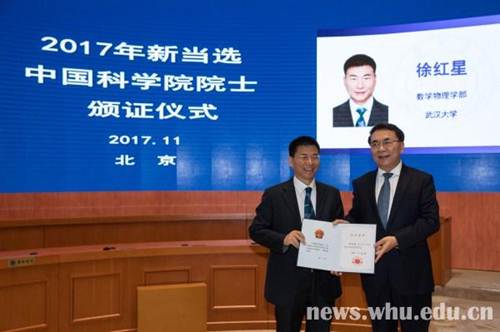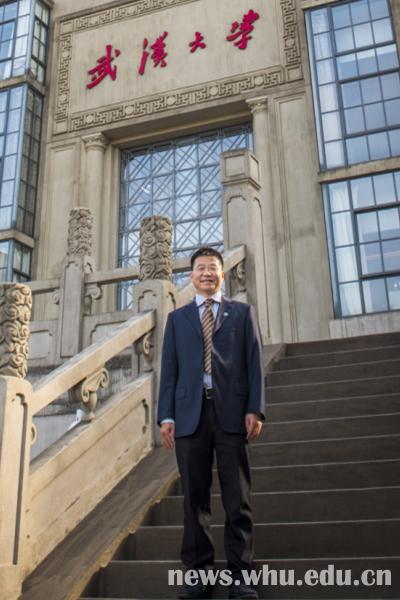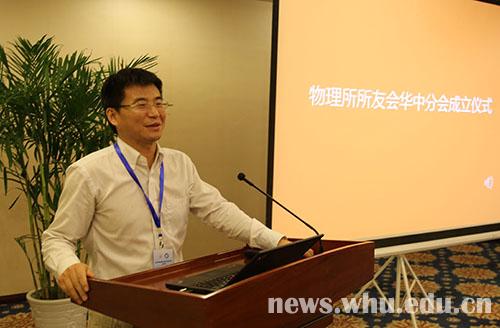An inspiring news arrived last November—Professor Xu Hongxing from the School of Physics and Technology at Wuhan University had been recently selected as a member of the Chinese Academy of Sciences (CAS). Prof. Xu is the first one in Wuhan University who has received this honor in physics.

Bai Chunli, president of the Chinese Academy of Sciences (right) presenting the award to Xu Hongxing (left)
Innovation of the R&D system
“People demand smaller-sized optical components as our society develops. For scientific researchers, our work is to provide technical support with our knowledge in science,” said Prof. Xu. One of his research results is aimed at breaking a bottleneck in physics—the light diffraction limit. His work has made it possible both theoretically and technically to break through traditional constraints in physics which diminished optical instruments.
Being a pioneer in the fields of the single-molecule surface-enhanced spectra and plasmonics, Xu first discovered in the lab the enormous electromagnetic enhancement in the gaps of metal nanostructure, physical bases for hypersensitive spectral sensing and others based on the study of nanogap effects. His efforts in nanophotonics have charted a new direction for nanoscale optical chip studies.
His research interests include plasmonics, nanophotonics, surface-enhanced spectroscopy, tip-enhanced spectroscopy, plasmon-enhanced light-matter interactions, plasmonic waveguides, and nanophotonic circuits. He has published more than 180 peer-reviewed papers and a book “Nanophotonics: Manipulating Light with Plasmons”, which have been cited more than 12,000 times with the H-index of 54. He has given more than 60 invited presentations at international conferences, and organized more than 20 international conferences and workshops. He is the associate editor of Nanoscale, and once was the associate editor of Optics Express from 2012 to 2015. He serves on the editorial board of Nanophotonics, Frontiers of Physics, etc.

Professor Xu Hongxing
Chen Nanxian, member of the Chinese Academy of Science and China’s celebrated physicist from Tsinghua University has a high opinion of Xu’s scientific research. “He has made numerous innovations in the mechanism for scientific innovation and has led the way in this regard. As to nanophotonics, it is self-evident that he is among the best researchers in China. Meanwhile, his work has generated tremendous international implications.” commented Prof. Chen.
“Scientific researchers are supposed to create innovations that have a series of tiers. The first tier is about innovation of scientific achievements; the second, innovation in scientific methods; the third, innovating the system of science. Of these tiers, innovation in the scientific system is obviously far more important,” explained Chen.
“Give it another shot”
At midnight, Chen Wen, one of Xu’s students, felt a little bit drowsy in the lab. So, he shook his head and continued his research. But Chen felt depressed and doubtful about himself in the face of repeated failures in highly-demanding experiments.
Standing beside Chen, Xu encouraged his student smilingly, saying “just give it another shot.” Seemingly, Xu had spotted signs of Chen’s apprehension and then bucked him up by saying, “last time you did a great job and produced some good results except a glitch in your figures. But that doesn’t matter. Don’t lose any confidence in yourself because this project you are working on is absolutely viable. What it needs is just time. You are expected to have a significant scientific result soon.”
Xu’s words warmed Chen’s heart and helped him regain confidence and courage. It’s through Xu’s encouragement and motivation that Chen has achieved bountiful academic results. “No matter what difficulties lie ahead, Prof. Xu would go to any lengths to work out a way forward,” said Chen. “Prof. Xu has had a great impact on my perceptions of scientific research since he instructed me step by step,” added Chen.
“Give it another shot”—a simple line of encouraging words will linger on among his students.
Xu gives full support to scientific research
Professor Jing Shi and Professor Xu have been bosom friends for many years. Prof. Xu’s connection with Wuhan University stems from the assistance of Prof. Shi Jing and Prof. Liu Chang.
Years ago, Prof. Jing Shi was utterly infatuated with Xu’s academic accomplishments and his modest personality and his longing for cooperation. “Xu joining the School of Physics and Technology has given a major boost to the development of physics of our university,” said Shi. According to Prof. Shi, Xu’s contributions can be summarized as follows—Firstly, Xu’s scientific research has achieved prolific results. As a result, his personal academic influence has promoted that of this subject; secondly, following his election as dean of the School of Physics and Technology, he has been very proactive in collaborating with others to adjust the orientations of the school’s scientific research to be mainstream yet distinctive; lastly, thanks to his distinct approaches to scientific research, the school’s recruitment of top talents has yielded tangible outcomes.
As a case in point, the school brought in two, six and three experts under the Thousand Talents Plan in 2015, 2016 and 2017 respectively.
At present, the school boasts a range of teachers with young and middle-aged backbone teachers with a reasonable mix of professional titles and knowledge structure. To give some examples, there is 1 chief scientist of the 973 Project, four special professors of the Chang Jiang Scholars Program, three professors for the New Century Talents Project, two leading experts in scientific innovation under the Ten Thousand Talent Program and so on.

Professor Xu Hongxing
“Prof. Xu gives full support to scientific research,” said Professor Yuan Shengjun, a member of ‘the Thousand Talents Plan’. Right after Yuan returned to China from Radboud University Nijmegen, he found it difficult to carry out scientific research. In one case, Yuan was working on a research project that has to be done on supercomputers for large-scale computing. Hearing the news, Xu decided to help him out by recommending that he should perform his experiments on Sunway Taihu Light in Wuxi, Jiangsu Province and the Milkyway-2 in Guangzhou.
“Wuhan University was one of the top four state universities of the People’s Republic of China. One day, Wuhan University will reestablish its historical position as a key university in China. This will be the historical trend,” said Xu. Xu’ s deep love of the university explains why he is so enthusiastic about his work.
Rewritten by Tang Lingjie
Photo by news.whu.edu.cn
Edited by Li Yunzhen, Wang Wei, Edmund Wai Man Lai & Hu Sijia